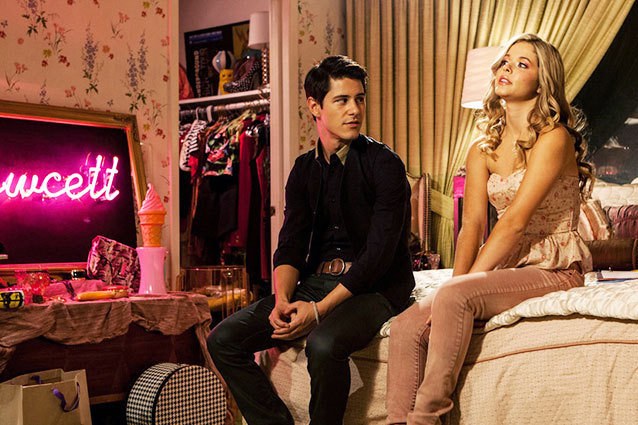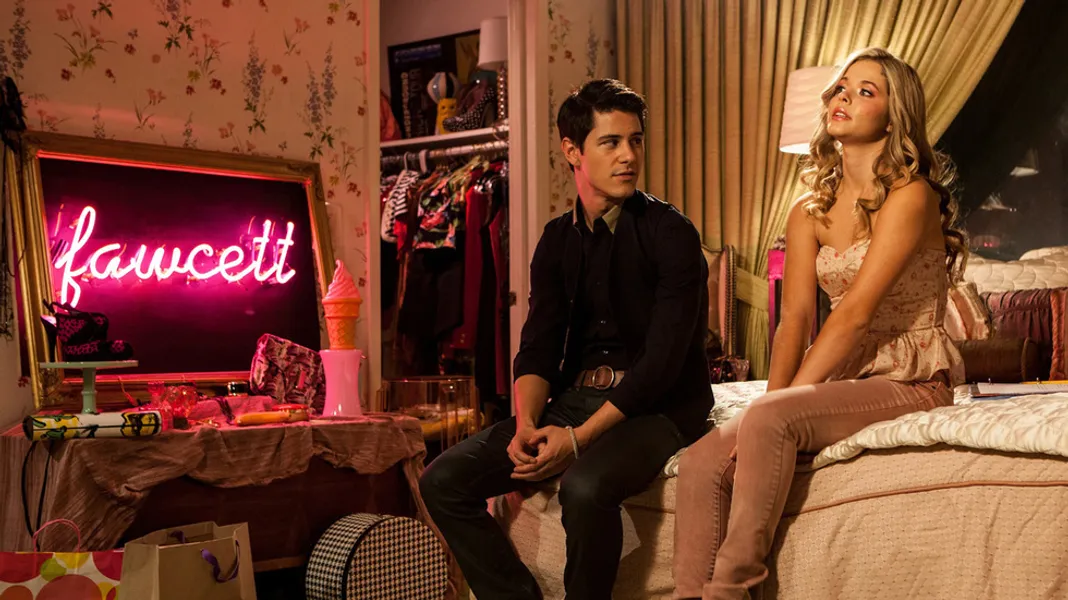
If Molly Ringwald — be she poor and unpopular or rich and revered — had her eye on some dreamboat, you can bet your letterman jacket that John Hughes would stick the two of ’em together in the end. The pair would share a kiss over a flaming cake or outside their incarcerating high school, just in time for the credits to roll and our eyes to tear up. That’s the Hollywood ending. The more or less satisfying, albeit sometimes offensively flimsy, conclusion that brings two physically appealing young white people together. Forever. It doesn’t matter how little substance backs their teenage love affair, nor how disturbingly misguided their romance might in fact be (remember Can’t Hardly Wait? We’re supposed to believe she falls totally in love with her stalker mere hours after her very first inkling that he even exists?), audiences just eat up these glitzy, amorous bonds.
It’s a time-tested tradition throughout mainstream cinema. Sure, not all movies opt for the schmaltzy, ice cream finale, vying instead for something bleak, bittersweet, and embedded in realism, but we’re moreover guaranteed a presence of that Hollywood send-off throughout the industry’s rom-com output. Except, for some reason, when it comes to gay movies. Take Tribeca’s G.B.F., a bubbly, colorful, pithy high school comedy, centering on the newly outed student Tanner (Michael J. Willett) and his closeted best friend Brent (Paul Iacono). When Tanner becomes the apple of every popular girl’s eye, each of the school’s queen bees coveting the glimmering accessory of Gay Best Friend, it puts a strain on his longtime camaraderie with Brent, leading — in classic rom-com fashion — to a fight, then a reconciliation, then a kiss, then an infatuation. And if this were your average heterosexual high school movie, you’d likely wind up with a romantic union to tie the story together and warm the audience’s hearts. You’d see an eternal adhesion Tanner and Brenda, or Tanya and Brent. It’d be goofy, neglectful of real world consequences, and surface value ecstasy.
All of that would fit just fine into G.B.F., which, despite being sweet, progressive, and insightful at times, is just your ordinary candy-coated high school romp. But for whatever reason, a Hollywood ending is avoided, despite a very Hollywood beginning and middle. The movie wraps with Tanner and Brent agreeing that they’re better as friends, dismissing their obvious attraction to one another (or at the very least, Brent’s attraction to Tanner), and carrying on perpetually with their platonic affection.
On the one hand, this is reassuring. At least the movie recognizes something rare for show business: just because these two characters both happen to be gay, that doesn’t mean they “belong” together. But in this chewing gum reality of G.B.F., these two lifelong best friends do seem to belong together. At least no less than Molly Ringwald and Michael Schoeffling or Ethan Embry and Jennifer Love Hewitt or Alicia Silverstone and her Paul Rudd step-brother. In movies as bright and brimming as Sixteen Candles, Can’t Hardly Wait, and Clueless, the Hollywood ending makes sense — the same can be said for the equally fast-paced and sparkly G.B.F.. So why, then, don’t we see the credits roll over a long anticipated Tanner/Brent kiss?
Why, in fact, are we so rarely inclined to see this kind of ending in movies about gay couples? Although the film industry is gradually inviting more films about homosexual relationships toward the mainstream, they all seem to vie for the bleak and bittersweet… or just bitter. The most famous entry to date is Brokeback Mountain, which chronicled the passionate love of cowboys Heath Ledger (who totally ended up with the girl in 10 Things I Hate About You) and Jake Gyllenhaal (who totally ended up with the girl in Bubble Boy… sorry for bringing up Bubble Boy), ripping the enamored men apart and killing the latter prematurely. Following in the same vein, we have romantic dramas like Weekend, A Single Man, Shelter all shoot for sorrow and sobriety. While films like these, about straight and gay romances alike, are imporant and valuable, it feels like something is missing. If there is something to be gained from the endings of Clueless and 10 Things, then there would be something to be gained by a saccharine intertwining of G.B.F.‘s heroes.
But that’s not what we get, despite all the signs pointing to it as the logical shot for the film’s final moments. Is it simply that Hollywood is still afraid of tackling a gay romance under the guise of a mainstream movie? Even when presenting a movie that is about being gay and celebrates open-mindedness and tolerance and disparages objectification, we run into this aversion. And it’s frightening — if G.B.F., a movie tailor made for the sort of Kat-and-Patrick wrap-up, is afraid of or otherwise opposed to this kind of closer, then where on Earth are we going to find it?
Sure, you’ll find no shortage of filmgoers who can’t stand the rom-com genre. It’s fake, vapid, superficial. But it’s a tradition, and one that seems to make everyone else happy. These movies, in delivering shiny stories as thick as cardboard, foster the belief in true love. They sell romance in the simplest of forms, begging viewers to buy into the mentality, if only to pony up the dough for the next big picture release. But capitalistic intentions aside, the same process should be afforded to same-sex rom-coms. The same sort of flimsy, chocolate-chomping “true love” should be touted in regards to the likes of Tanner and Brent. Gay moviegoers deserve to see themselves in the same light as the Ringwalds and Silverstones, deserve to be fed the same line of Fluffernutter as their straight counterparts. Movies like Can’t Hardly Wait, 10 Things I Hate About You, Clueless, and everything by John Hughes might be hokey and ill-fit for realistic expectation, but they serve a purpose: they purport something people want to believe in. And that needs to happen for the G.B.F.s of the world, too.
Follow Michael Arbeiter on Twitter @MichaelArbeiter
More:
Tribeca ’13: 15 Films That Belong on Your Radar
Alice Eve’s Tribeca Indie ‘Some Velvet Morning’ Is Not That Different from ‘Star Trek’
Tribeca’s Child Abuse Horror Movie ‘Dark Touch’ Bends the Genre, Is Legitimately Horrifying
From Our Partners: Eva Longoria Bikinis on Spring Break (Celebuzz)
Eva Longoria Bikinis on Spring Break (Celebuzz) 33 Child Stars: Where Are They Now? (Celebuzz)
33 Child Stars: Where Are They Now? (Celebuzz)


